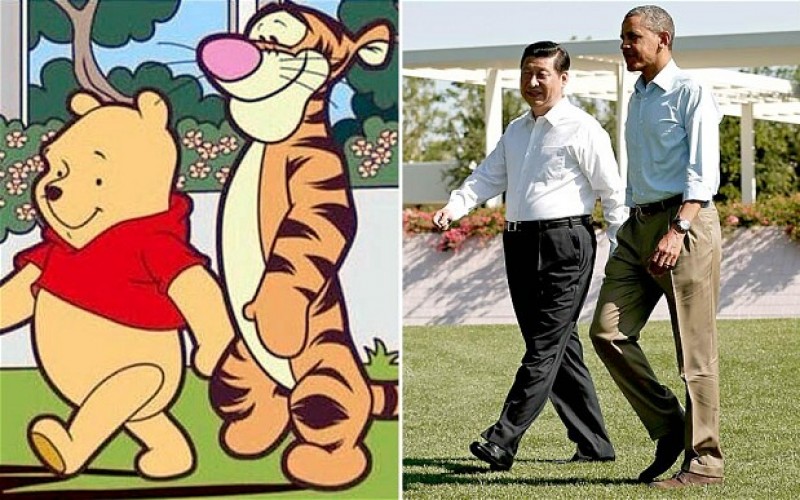China Bans Winnie the Pooh As Memes Mocking Xi Jinping Resurface Online

- Funny
- Offensive
Winnie the Pooh and Censorship, Too
July 18th, 2017 – A honey-guzzling, friendship-crusading bear may be used in America to help kids fall asleep, but in China Winnie the Pooh is being used as a means to criticize President Xi Jinping. This literary licensing has not amused the Communist government and has now resulted in a more severe censorship of the name and likeness of the beloved story time character.
The Chinese government has long battled criticism and mockery of President Xi; blocking content or banning communication that uses certain key words or phases over the years. Winnie the Pooh isn’t even a new target. Back in 2013, President Obama’s meeting in California with the Chinese leader prompted side-by-side comparisons of the two as Pooh and Tigger.

Continuing the trend of assigning likeness to A.A. Milne’s most plump character continued steadily. Prime Minister of Japan Shinzo Abe shook President Xi’s hand in 2014 and Internet users quickly compared the awkward exchange to Pooh and Eeyore.
Chinese Internet users FTW. #APEC2014 pic.twitter.com/6wFDvhlaNv
— Josh Chin 李肇华 (@joshchin) November 10, 2014
And not to be outdone by a melancholic donkey, online communities went back to reliable Winnie the Pooh in 2015. This time, however, Christopher Robin’s best friend was poking his head out of a car. That specific scene was used to mock President Xi as he rode his Red Flag limousine during a parade marking the 70th anniversary of the end of World War II.

According to research by King-wa Fu at the University of Hong Kong, Winnie-the-Pooh made the list of one of the most censored images on Chinese social media in 2015.
The revived use of Winnie the Pooh online has been linked to the upcoming Communist Party Congress this fall. Occurring every five years, it appoints new members to the Politburo Standing Committee – the top leadership of the Communist Party of China. The congress will also coincide with the beginning of President Xi’s second term and has been reported as an opportunity for the leader to cement his control of power.
The impending meeting has provoked the Chinese government to heighten the censors on Winnie the Pooh wording and images in recent weeks. On the Twitter-like site Weibo, commenting on posts with “xiao xiong wei ni” (or “Winnie the Little Bear” as he is known there) would result in an error message. Other reports have indicated that online searches for the term will result in the warning “content is illegal.” Animated GIFs of the bear were also deleted from the texting app WeChat.
Merriden Varrall, director of the East Asia Program at the Lowy Institute in Sydney, noted that the Winnie the Pooh jokes were viewed as damaging to the Communist Party’s means of rule.
“The leadership is probably even more sensitive right now” she said.
“I mean it’s a little bit humourless at the best of times, but it’s even more sensitive at the moment about any kind of apparent ridiculing of the Chinese party leaders.”
In the past, that sensitivity has lead Chinese residents to use code words such as “watches” or “river crabs” to describe the characteristics of the government online. With Winnie the Pooh having a target on his buxom back, we could soon be tracking new code words when discussing the physical characteristics of President Xi.
What do you think about the Winnie the Pooh censorship in China? How do these instances affect the topic of freedom of speech in the United States?
